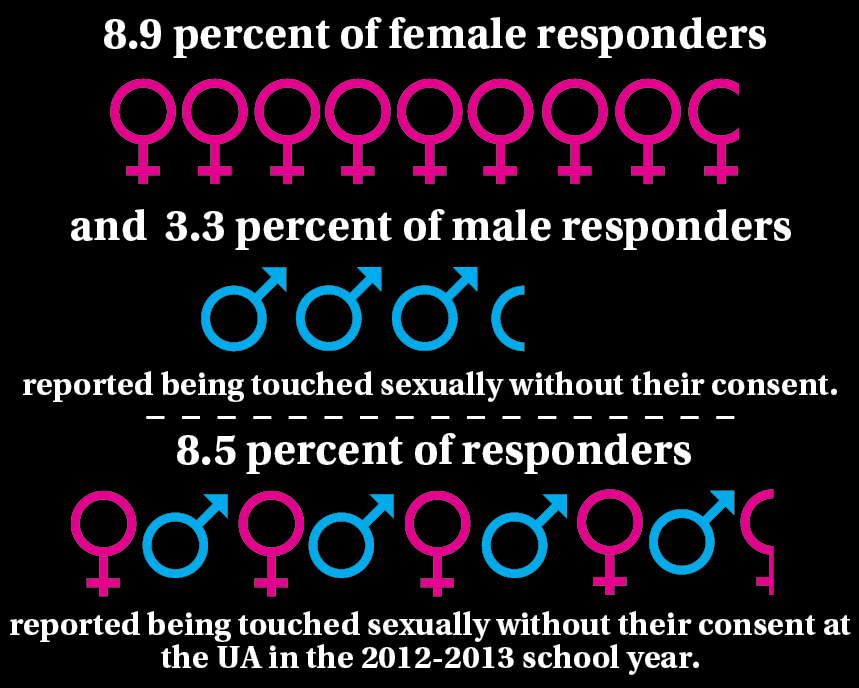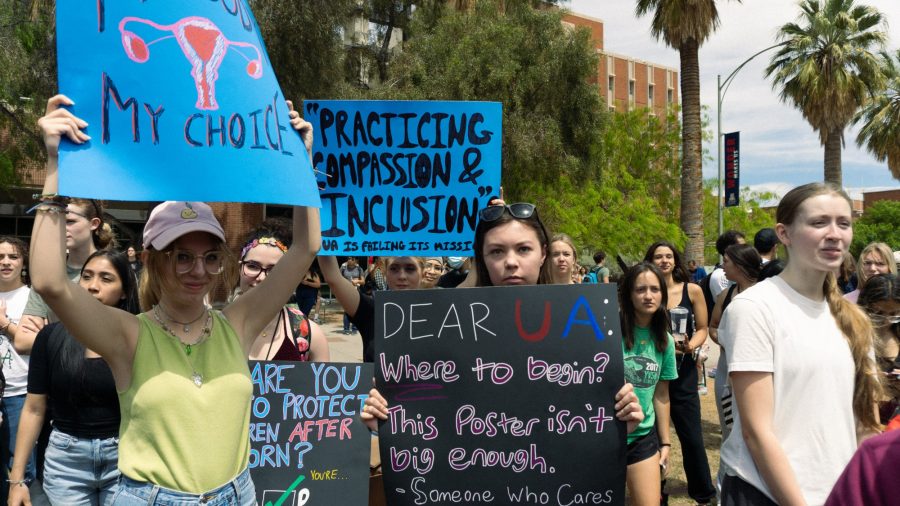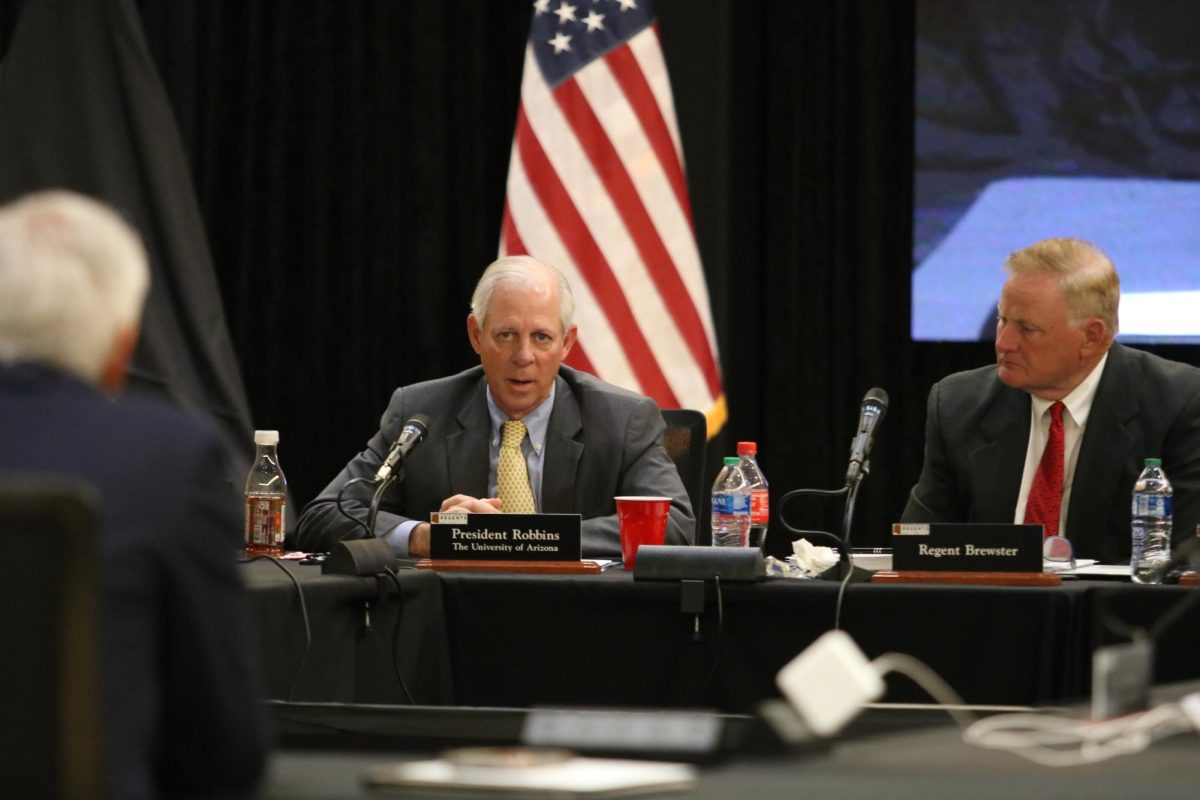Today kicks off April as sexual assault awareness month, which aims to bring the discussion about sexual assault to the forefront.
“Sexual assault is still a problem, which is why we need to do everything we can,” said Megan McKendry, the violence prevention specialist at the Oasis Program.
Sexual assault is notoriously underreported by victims, but reporting has recently been increasing. According to the UA’s 2014 Annual Campus Safety, Security and Fire Safety Report, in 2013, there were 28 reported cases of forcible sexual offenses on the main campus. In 2012, there were 19, and in 2011, there were four reported.
This increase has been attributed by some to the shift in the culture surrounding sexual assault through campus programs.
“Our belief is that because we’ve enhanced our education outreach on campus, more people are a) aware of what their options are and b) are more comfortable with reporting, because there’s less stigma with reporting,” said Kendal Washington White, assistant vice president for Student Affairs, Dean of Students and Deputy Title IX Coordinator at the UA.
Prevention on campus
On the UA campus, there are multiple organizations that have the goal of educating the student body, raising awareness and stopping sexual assault.
The Associated Students of the University of Arizona signed on to the national “It’s On Us” campaign last semester, and since then, it’s been referred to as ASUA’s first priority by current ASUA President Issac Ortega. The “It’s On Us” campaign is a national awareness campaign where individuals and groups can pledge to help put an end to sexual assault.
“This semester, our main focus is just to keep the message persistent,” Ortega said. “I think it’s super important to keep the conversation going.”
Ortega said one of the main goals of the campaign has been to create a campus culture where people feel safe to report.
By the end of the school year, Ortega wants to put up a part two to a video made last semester and launch a poster campaign in the dorms that would use quotes from celebrities to raise awareness.
Manny Felix, next year’s ASUA president, wants to continue the campaign.
“It’s something so important that if you don’t talk about it, then it’ll be hidden in the dark,” Felix said.
Felix said he also wants to expand the program by including more of Greek Life, the diversity centers and the cultural centers on campus.
“I think it’s also better to work with other organizations and programs rather than work separately,” Felix said.
Oasis has multiple events planned throughout April for sexual assault awareness month. Oasis’ most well-known event is Take Back the Night, an international event where attendees can talk about their experiences and protest against sexual assault on campus, which will be held on April 14 from 6-8 p.m. in the UA Women’s Plaza of Honor.
Students Promoting Empowerment and Consent is a subset of Oasis mainly comprised of student interns that also holds events year-round.
“We need to be teaching students and everyone on campus what is consent,” said Jacquelyn Hinek, a student Oasis intern and social media and outreach co-coordinator for SPEAC.
“We can’t just brush it off and say, ‘Well, it’s someone else’s problem,’” Hinek said.
The Dean of Students Office has sexual assault awareness initiatives including posters, online education, in-person workshops and presentations.
“I think we’ve done a lot,” Washington White said, “but we could always do more.”
The Dean of Students Office is currently looking into doing more in-person workshops with students and training student volunteers to do peer-to-peer training.
Reporting sexual assault
“It’s a very courageous, very brave move for a survivor to report,” Hinek said.
When a sexual assault occurs, it is the choice of the victim if they want to report it and how.
On campus, there are three different ways the victim can approach reporting and getting help. Students or staff who have been assaulted can go to one of the options, or they can go to all three, and each has its own benefits.
Oasis is considered the first step by some, especially if the victim does not want to file a report, because of its anonymity.
Oasis offers two free individual counseling sessions and also offers free group counseling. While Campus Health does offer emergency contraceptives and medical exams, the services are not specifically designed for sexual assault survivors. Depending on when the assault occurred, it is recommended students go to a hospital for a medical forensic exam, according to McKendry.
The second option a student has is to go to the Dean of Students Office. There, they can press charges through the university where the accused is investigated for breaking the Student Code of Conduct.
One drawback to this is that the victim needs to know the name of the person who assaulted them in order to have it investigated, but an initial report can still be filed without it.
The investigation process starts with the complainant sharing the story of what happened in detail and answering questions about it.
“That is very emotional when you have to tell someone who’s a complete stranger what happened to you,” Hinek said.
If the investigative process moves forward, witnesses are brought in and interviewed. There are rarely eye witnesses, but the investigative team interviews those who the complainant told, who they were with and others. Finally, the accused is brought in to tell their side of the story.
“We don’t immediately say, ‘Yes, we believe everything you’re saying,’” Washington White said. “We’re fact-finders.”
If a student files a report with the Dean of Students Office and chooses not to start an investigation, the student can change their mind and move forward at a later date, because there is no statute of limitations with the Student Code of Conduct.
Investigations are recommended to take no longer than 60 days by the U.S. Department of Education, but there is no true set time limit, as schools are only required to be prompt with their investigations.
What the office can do for a student depends on the details of the case, but some of the options include moving the student or the accused to a different dorm, changing class schedules to different sections and providing no-contact orders that keep the accused away from the victim.
The third option is for the victim to file a report with University of Arizona Police Department or Tucson Police Department, depending on the location where it occurred. If the victim chooses, charges and a formal police investigation could be started. If a student goes to UAPD, the Dean of Students Office is also notified.
Having three different options can be beneficial to students, but that also means that there’s a discrepancy between the numbers that occur, because some students only go to one or two instead of all three.
Washington White said the important thing is people do report.
“I just want people to report to whomever they feel comfortable with,” she said.

Keeping the conversation going
Education and awareness of sexual assault are two of the main weapons that people use to fight it.
Facilitating a discussion about sexual assault can experience significant drawbacks when people are afraid or hesitant about having that discussion.
“There are a lot of people who don’t want to talk about it,” Hinek said.
She added that this especially occurs with young women, the demographic most at risk for sexual assault.
She partially attributed this to how some people use myths to assure themselves it could never happen to them.
“As soon as we accept the fact that it can happen to anyone at any time, it becomes very real and really scary,” Hinek said, “and all of a sudden, we could be victimized.”
Diversity of people and opinion is also something that needs to be brought to the discussion, she added.
“When we don’t have men there, we don’t have fraternity or sorority members there or people from the culture centers there,” Hinek said, “we’re maybe only getting one opinion.”
There are simple ways someone could go about maintaining the conversation about sexual assault.
Some of these are talking to friends, believing survivors when they come forward and challenging the language people use that normalizes rape, McKendry said.
“This kind of prevention messaging really needs to reach people sooner than college,” McKendry said. “It needs to reach people when they’re in elementary school, middle school and high school.”
If you or someone you know has been assaulted and is looking for help, the Dean of Students Office can be contacted at (520) 621-7057, and Oasis can be contacted at (520) 626-2051.
_______________
Follow Annie Dickman on Twitter.









